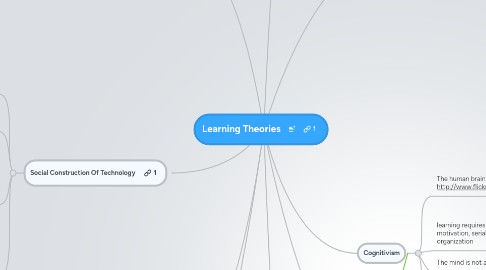
1. COGNITIVE LOAD
1.1. the brain can be overloaded or underloaded
1.1.1. rule of 7
1.1.2. error/ fundamental attribution error
1.2. To facilitate movement of information from the working memory to the long-term memory: mneumonic devices, chunking, metaphor/ symbolism, mental maps, advanced organizers, put information into context (landscaping)
1.3. How things are presented matters
1.3.1. avoid clutter
1.4. How things are organized matters
1.4.1. use sequential ideas
2. Social Construction Of Technology
2.1. How technology is used is based on social acceptance.
2.2. Development of technology is directed by human societies values.
2.3. The internet t-shirt (so cool!!) http://www.youtube.com/watch?v=q0GokKd2QRA&feature=share&list=PL31C939256806D7A1
2.4. 4-H goes Digital : http://www.youtube.com/watch?v=WZ7zaChZayU&feature=share&list=PLBE32372BB9E110E5
3. Constructivism
3.1. Learning is constructed, building on previous knowledge and experience
3.1.1. a network
3.2. The teacher acts as a facilitator to student exploration of ideas and attempts at problem solving.
3.2.1. Five Year Olds Pilot their own Learning Projects: http://youtu.be/_eyucHMifto
3.2.2. problem based learning
3.2.3. authentic tasks
3.3. places learning in the hands of the learner, students ask themselves, "How does this fit with what I already know?"
3.4. Knowledge is internal
3.5. Technology- role playing video games, Minecraft, Lego Robotics
4. Connectivism
4.1. Learning in a technology-rich world
4.2. The ability to connect to and find knowledge is, perhaps, more important than having knowledge.
4.2.1. Hackschooling ; From the mouths of babes ; http://www.youtube.com/watch?v=h11u3vtcpaY&feature=share&list=PLBE32372BB9E110E5
4.3. Teaching students to connect and use digital tools for learning
4.4. learning rests in the diversity of opinions
4.5. the ability to see connections between ideas and concepts and fields is a core skill
4.6. Technology- MOOC!, Twitter, Facebook, search engines
5. Media Ecology
5.1. The study of communication mediums as environments- living, evolving and changing
5.2. For more resources: http://www.media-ecology.org/
5.3. How does this look in the classroom today? http://www.youtube.com/watch?v=dGCJ46vyR9o
6. Behaviouralism
6.1. B.F. Skinner , Thorndyke, Pavlov
6.2. Behaviours can be controlled using positive reinforcement or negative reinforcement
6.2.1. stimulus- response; operant conditioning; punishment; negative reinforcement
6.3. We can control and measure learning through conditioning
6.3.1. modelling, shaping, cuing, drill and practice
6.4. Knowledge is external to the learner
6.5. Big Bang uses reinforement http://youtu.be/FjqDfpLYuyc
6.6. Implications for Education
6.6.1. direct instruction
6.6.2. teacher-directed
6.6.3. teacher lectures, children listen
6.6.4. drill and practice
6.7. Tech
6.7.1. Math Blaster
6.7.2. iClickers
6.7.3. Ted Talks
6.7.4. reward systems
7. Cognitivism
7.1. The human brain is like a computer http://www.flickr.com/photos/27419875@N04/5916709446/
7.1.1. sensory memory
7.1.2. working memory
7.1.3. long-term memory
7.2. learning requires meaningful effect, motivation, seriality, practice, organization
7.3. The mind is not a blank slate
7.4. A Fairytale of Manageable Cognitive Load: http://youtu.be/I_51AVBI90o
8. TPACK
8.1. A framework of necessary domains for the integration of technology in education
8.1.1. TK- technological knowledge
8.1.1.1. the ability to use technology
8.1.1.1.1. does the tech do what I think it does?
8.1.1.1.2. will the tech be useful to my students?
8.1.2. CK- content knowledge
8.1.2.1. what do my students need to know
8.1.3. PK- pedagogical knowledge
8.1.3.1. Are the tasks suited to my learners?
8.1.3.2. do my students have the prior knowledge needed to understand?
8.1.3.3. what scaffolds are needed in order to reach the outcomes?
9. Theory of Teachnology
9.1. The teachers ability to use technology to enhance student learning
9.2. Using tech for Enhancement- the end product is the same as w/o tech. No grade point average increase.
9.2.1. Augmentation- tech acts as a way of communicating with teacher w/o face to face. eg. a student can use Google Docs and teacher can give input for improvement during non-school hours.
9.2.2. Substitution- The teacher uses tech as a medium instead of the usual method. Nothing really changes. eg- using the Smartboard to write notes instead of the blackboard.
9.3. Using tech for Transformation- the use of tech changes the learning experience to something new. Grade point averages are increased.
9.3.1. Redefinition- tech makes possible new types of tasks that are not possible w/o it. eg- students can measure incalculable distances and make videos of the experience. Average of 1 grade point increase.
9.3.2. Modification- tech allows tasks to be done in completely different ways than the traditional. eg. dissection on-line allows for trial and error. 1/2 grade point average increase.
